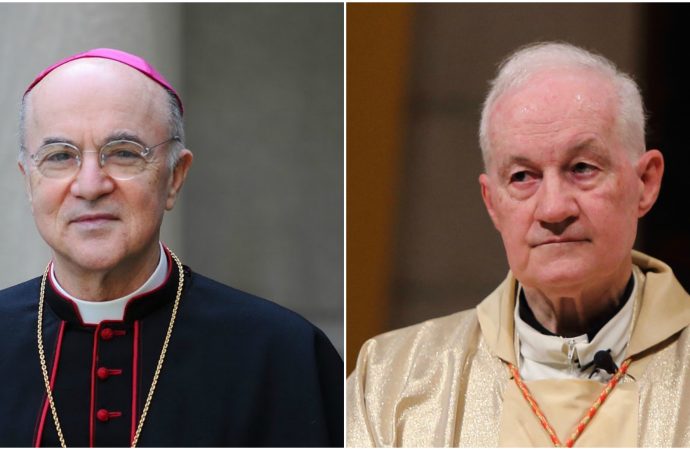Ex-papal Envoy Denounces ‘scourge of Homosexuality’ in Abuse Crisis
By Claire Giangrave
In a new and now third public letter, a former Vatican envoy to the United States said the Vatican’s top official for overseeing bishops confirmed many of his accusations of negligence in the handling of an infamous ex-cardinal charged with sexual abuse and once again pointed to homosexuality as the cause of the abuse crisis facing the Catholic Church. “Cardinal [Marc] Ouellet concedes the important claims that I did and do make, and disputes claims I don’t make and never made,” said Italian Archbishop Carlo Maria Vigano in a letter published on the blog of Italian conservative journalist Marco Tosatti Oct. 19. Earlier this month, Ouellet, prefect of the Vatican’s Congregation for Bishops, published a letter accusing Vigano of a political “frame job” and a “deplorable and incomprehensible attack” on Pope Francis, after Vigano accused the pontiff of knowing about sexual misconduct concerns regarding ex-Cardinal Theodore McCarrick in 2013 and taking no action. In his original letter released Aug. 26, Vigano called on Francis to resign. Ouellet also stated that there were no formal “sanctions” against McCarrick imposed by Pope emeritus Benedict XVI that Francis ignored, contrary to Vigano’s allegation. In what has become a Vatican “he said-he said” scenario, Vigano answered Ouellet’s letter by stating that his rebuke has reinforced him in his decision and, furthermore, serves to “vindicate” his claims. The former U.S. ambassador said that Ouellet’s letter confirms they both spoke about the McCarrick situation, that they corresponded about the “conditions and restrictions” imposed against the ex-cardinal by Benedict, which “forbade McCarrick to travel or to make public appearances.” Ouellet acknowledged that McCarrick was “strongly encouraged” to keep a low public profile and was urged to live a “private life” of silence “with the rigor of canonical penalties,” though he claims these were not actual sanctions since there was not enough proof. While Vigano admits in his latest letter they “were not technically ‘sanctions’ but provisions,” he also added that to “quibble” over the distinction is a matter of “pure legalism” and that “from a pastoral point of view they are exactly the same thing.” Regarding Ouellet’s observation that it would have been impossible for Francis to properly assess the information given to him on McCarrick while he was meeting numerous nuncios, Vigano stated that the question was fully addressed in private when he told the pope that the ex-cardinal had “sexually corrupted his own seminarians and priests.” “No pope could forget that,” he added. Concerning the crucial question of archival letters proving the long-standing knowledge inside the Vatican of McCarrick’s sexual abuses, strongly denied by Ouellet, Vigano insists that the bishop’s czar holds “key documents” of mishandling and coverup even if not written by Francis or Benedict XVI. “The Holy See was aware of a variety of concrete facts, and is in possession of documentary proof,” Vigano wrote, adding that “the responsible persons nevertheless chose not to intervene or were prevented from doing so.” He listed compensation paid by the Archdiocese of Newark and the Diocese of Metuchen to the victims of McCarrick’s sexual abuse, letters of Father Boniface Ramsey, of previous papal envoys Archbiship Gabriel Montalvo in 2000 and Archbishop Pietro Sambi in 2006, of Dr. Richard Sipe in 2008, and Vigano’s own notes to the superiors of the Secretariat of State, allegedly describing in detail the concrete allegations against McCarrick. “Are all these just rumors?” Viagno asks. “They are official correspondence, not gossip from the sacristy.” Viagno shared a timeline of what he states were his interactions with Ouellet and Francis concerning the McCarrick case. On June 21, 2013, he states that Francis spoke “cryptically to him about the U.S. episcopacy” and that two days later the pontiff asked him what he made of McCarrick, but no action was taken. “Pope Francis himself has either colluded in this corruption, or, knowing what he does, is gravely negligent in failing to oppose it and uproot it,” Vigano said. Finally, the letter points to “two dramatic silences,” the first being the plight of victims and the second being “the corrupting influence of homosexuality in the priesthood.” “This is a crisis due to the scourge of homosexuality, in its agents, in its motives, in its resistance to reform,” he wrote. “It is no exaggeration to say that homosexuality has become a plague in the clergy, and it can only be eradicated with spiritual weapons.” While the letter opened with an acknowledgement of the “alarm and dismay” that his allegations against Francis and the Vatican would entail, it concludes by appealing to other bishops and priests who can confirm and support his claims to speak.
|
.
Any original material on these pages is copyright © BishopAccountability.org 2004. Reproduce freely with attribution.
